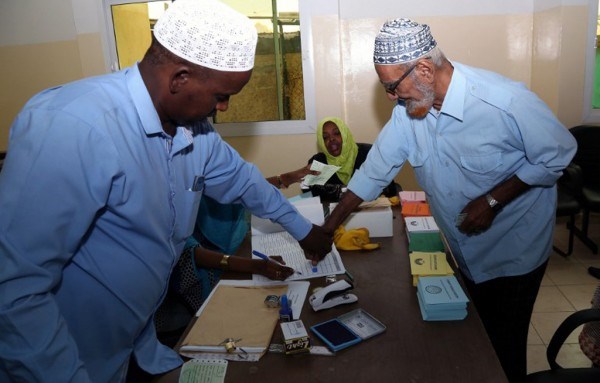Hiiraan Online
Friday February 23, 2018
Election officer inks a man's finger after casting his ballot during the Djiboutian presidential elections in a polling station at High Court building, in Djibouti City, Djibouti on April 8, 2016. Photo: MINASSE WONDIMU HAILU / ANADOLU AGENCY
Djibouti (HOL) - Djiboutians went to the polls on Friday morning to elect the country's next National Assembly. Voters began pouring into polling stations across the country at around 6 am this morning to elect candidates running for the 65 seats in the National Assembly or Chamber of Deputies as it is known locally.
Members will sit for a 5-year term.
The contenders have officially concluded their two weeks of campaigning on Wednesday.
The country's Electoral Commision had called on the more than half a million eligible voters turn up in large to participate the election.
35 of the 65 seats are contested in Djibouti's capital city.
- Union pour la Majorité Présidentielle (UMP)
- Djibouti Union for Democracy and Jastice (UDJ)
- Djiboutien pour le Développement(PDD)
- Centre Démocrate Unifié Djiboutien (CDU)
- Republican Alliance for Democracy (RAD)
Citing lack of transparency, the Mouvement pour le Renouveau Démocratique et le Développement (MRD) declared it will boycott the elections, just as they did in 2016 during the Presidential Elections.
The ruling political coalition Union pour la Majorité Présidentielle (UMP) or Union for the Presidential Majority led by incumbent President Ismaïl Omar Guelleh is expected by analysts to win the most seats. Unlike in 2013, the UMP is facing a divided opposition coalition. Furthermore, the UMP is the only party that has the financial and human resource to contest all 65 seats in the National Assembly.
The UMP dominates the current National Assembly with 43 seats.
The elections are expected to be observed by delegates from AU, EU, UN and IGAD.
African Union on Monday deployed 28 election observers who are drawn from 22 countries.
The AU delegates is led by the former Prime Minister of Central African Republic, Anicet Georges Dologuele
The polling stations will officially close at 6 P.M. local time.